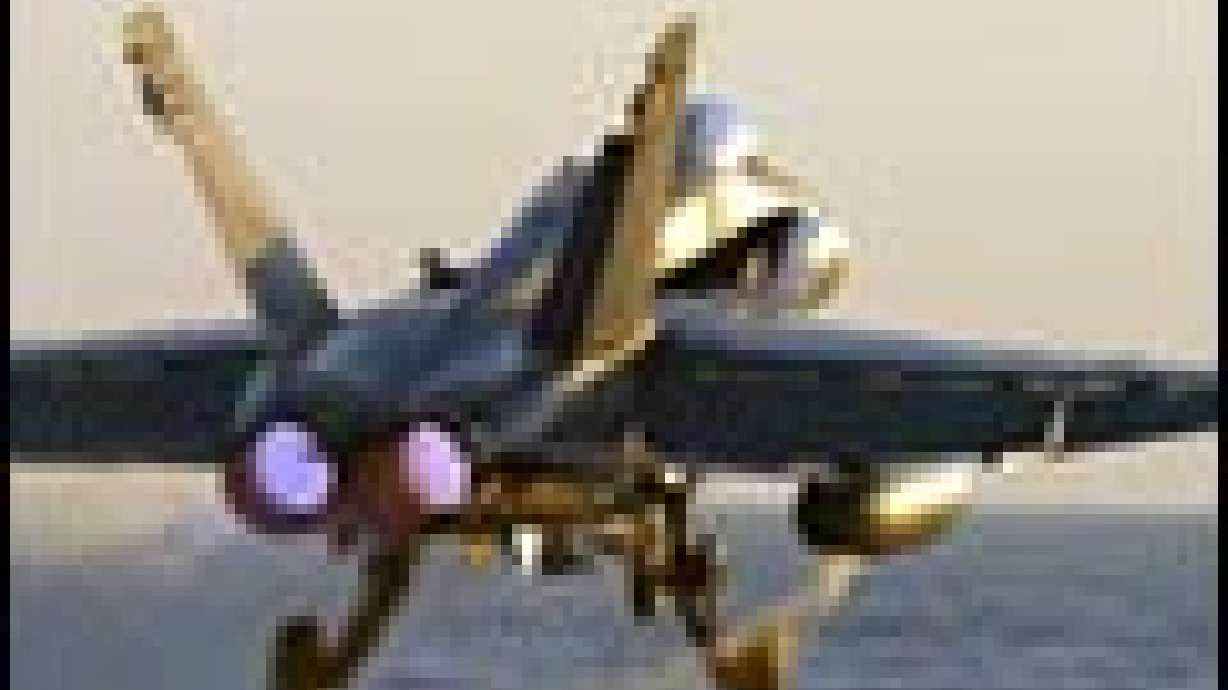Estimated read time: 2-3 minutes
This archived news story is available only for your personal, non-commercial use. Information in the story may be outdated or superseded by additional information. Reading or replaying the story in its archived form does not constitute a republication of the story.
OUTSKIRTS OF BAGHDAD, Iraq (AP) -- A giant C-130 transport plane landed at the Baghdad airport Sunday, the first known U.S. aircraft to arrive in the Iraqi capital since the airfield fell into U.S. hands.
Meanwhile, troops of the 101st Airborne Division exchanged gun and artillery fire with Iraqi forces probing the airport's 13-square-mile perimeter. No U.S. forces were hurt, but a dozen Iraqis were believed killed, said Maj. David Beachman, a battalion operations officer.
The airport, captured in an all-night battle last week, is expected to be a major resupply base for American forces and a key to channeling aid to Iraqi civilians. It offers critical landing strips that will let the military hopscotch over the 350-mile supply line that now stretches from the capital to U.S. bases in Kuwait.
It is also just 10 miles west of central Baghdad, adjacent to the Radwaniyah presidential residence.
Navy Lt. Mark Kitchens, a Central Command spokesman, confirmed the C-130 had landed but gave no details.
Iraqi Information Minister Mohammed Saeed al-Sahhaf has insisted Iraqi forces recaptured the airport. U.S. forces say they have effective control over the airfield, despite sporadic attacks like the one Sunday.
Troops of the 101st fortified their position at the sprawling airport Sunday, digging trenches and bulldozing sand berms. Two weapons caches -- including one with 12 crates of shoulder-fired missiles -- were found just outside the airport grounds. Troops also found 35 French-made Roland surface-to-air missiles in the airport complex.
During the fighting, a mortar exploded within 40 feet of a battalion commander scouting the airport perimeter. Beachman said air strikes and artillery barrages were called in to fight off Iraqi forces.
"It's fine right now. We know who's shooting at who," said Staff Sgt. Jeremy Reed, 29, of Dothan, Ala., as blasts of artillery fire whizzed overhead.
The airport troops belong to a 101st unit known as the "Iron Rakkasans" because of strips of burlap connected to their helmets that they call "iron hairs." It distinguishes them from other fighters in the division.
The troops were brought to Baghdad because they are light infantry fighters who are highly trained in urban combat. Now that they've arrived, there's little to do but wait.
Some, like Sgt. Jason Slusser, 24, of Wisconsin Rapids, Wis., are engaged in the universal search for sleep and soap. He said he was washing and doing his laundry in a small plastic tub.
"An all-out shower, no, but you can get a scrub," Slusser said.
Sgt. 1st Class Richard Clinton, 32, of Madison, Wis., said he "looking forward to the hot towels they give you on the plane on the way back."
Standing next to a dusty palm tree with a pit of trash burning nearby, he joked: "I'm reading the brochure before I sign up for the next trip."
(Copyright 2003 by The Associated Press. All Rights Reserved.)








